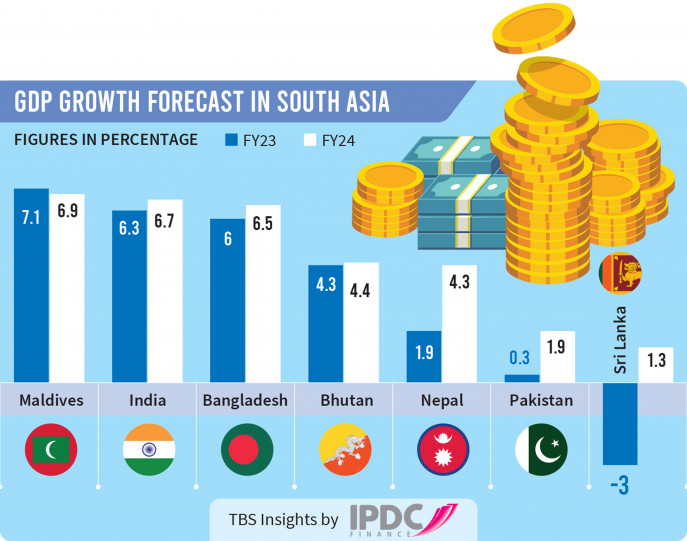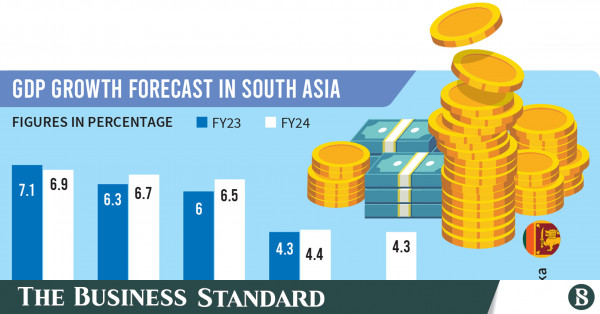Black_cats
ELITE MEMBER

- Joined
- Dec 31, 2010
- Messages
- 10,031
- Reaction score
- -5
Completion of major infrastructure projects to boost investment in Bangladesh: ADB
20 September, 2023, 10:20 pm
Last modified: 21 September, 2023, 12:03 am
Infographics: TBS
" style="box-sizing: inherit; outline: currentcolor; cursor: pointer;">

Infographics: TBS
The Asian Development Bank (ADB) has painted a promising picture for Bangladesh's economy in various indicators, including GDP growth, inflation, and trade this fiscal year.
Moderate inflation and an increase in remittances will contribute to reviving private consumption, while completion of a number of major government infrastructure projects will increase investment, according to the ADB's flagship report titled Asian Development Outlook 2023, released on Wednesday.
Among the major projects, the Padma Bridge has already been completed, the metro rail system has partially commenced operations with the Uttara to Motijheel route slated for public use later this year.
A section of the Dhaka Elevated Expressway has been inaugurated, and another significant endeavour, the Bangabandhu Tunnel beneath the River Karnaphuli in Chattogram, is scheduled to open for traffic next month.
Also, the third terminal of the Hazrat Shahjalal International Airport is set to be inaugurated within this year.
The ADB anticipates that these initiatives will have a positive impact on investment throughout the country.
Private investment, however, may be dampened by the initial higher interest rates resulting from a revision in the country's monetary policy framework, says the report.
Yet, the Manila-based multilateral funding agency has identified potential risks for the Bangladesh economy, which include adverse weather events and a worsening balance of payments situation if global demand turns out weaker than expected.
GDP forecast
The economic outlook for FY24 anticipates a slightly accelerated growth rate, driven by easing inflation and improved export performance.
The GDP growth projection for the current fiscal year stands at 6.5%, surpassing the 6.0% recorded last year.
This growth is underpinned by the ongoing export expansion, buoyed by the economic recovery in the euro area, says the report.
Also, import growth is poised to return to positive territory, primarily fueled by heightened demand for export-related intermediates and government imports.
The ADB's GDP forecast for Bangladesh remains higher than the World Bank's estimate of 6.2% and aligns with the International Monetary Fund's (IMF) projection of 6.5%. However, it falls short of the government's ambitious 7.5% growth target.
The revival of private consumption is expected to be bolstered by moderate inflation and an uptick in remittances.
Inflation outlook
According to the ADB report, inflation is expected to decrease to 6.6% in the current FY24.
Despite the possibility of elevated inflation in the initial months of the fiscal year, it is anticipated to subside due to lower global nonfuel commodity prices, improved agricultural production, and initial monetary policy tightening under a new framework.
Export and import growth
The ADO report indicates that Bangladesh's export growth is projected to slightly accelerate to 9.0% in FY24.
This growth is attributed to improved electricity and energy supply, as well as a fully market-oriented exchange rate, which is expected to support non-garment exports that experienced a sharp decline in FY23.
Imports are anticipated to rebound and grow by 7.0%, driven by increased demand for intermediates and capital goods.
Trade deficit and remittances
The trade deficit is forecasted to slightly widen to $17.3 billion in FY24 as imports are expected to outpace exports in nominal terms.
Remittances are set to grow at 8.4%, encouraged by a market-driven exchange rate and cash incentives, resulting in a slight narrowing of the current account deficit to 0.5% of GDP in FY24.
Impact of monetary policy changes
In FY24, Bangladesh is expected to transition from a monetary aggregate targeting framework to an interest rate targeting framework.
This change includes an increase in the policy interest rate and adjustments in lending rates for banks and non-bank financial institutions.
FY24 budget
The ADB notes that this year's budget aims to achieve a revenue-to-GDP ratio of 10.0% and an expenditure-to-GDP ratio of 15.2%, resulting in a fiscal deficit of 5.2% of GDP.
The deficit is anticipated to be financed primarily domestically, with 85.2% from banks and the remaining 14.8% from non-bank sources, primarily through the sale of national saving certificates.
Forecasts on South Asia region
The report forecasts a 5.5% growth rate for the South Asia region in 2023 and a 6.1% growth rate in 2024.
While Bangladesh's growth projections have improved, some other countries in the region, such as Nepal and Pakistan, have seen downward revisions.
The inflation forecast for South Asia in 2024 has been revised up to 6.4%.
ADB Chief Economist Albert Park notes that Asia and the Pacific are recovering steadily from the pandemic, driven by domestic demand and service activity.
However, challenges persist in industrial activity and exports, and the global growth and demand outlook for the following year remains uncertain.

 www.tbsnews.net
www.tbsnews.net
ECONOMY
TBS Report20 September, 2023, 10:20 pm
Last modified: 21 September, 2023, 12:03 am
Bangladesh's GDP is expected to grow 6.5% in FY24, compared to 6.0% last year, forecasts the ADB
Infographics: TBS
" style="box-sizing: inherit; outline: currentcolor; cursor: pointer;">

Infographics: TBS
The Asian Development Bank (ADB) has painted a promising picture for Bangladesh's economy in various indicators, including GDP growth, inflation, and trade this fiscal year.
Moderate inflation and an increase in remittances will contribute to reviving private consumption, while completion of a number of major government infrastructure projects will increase investment, according to the ADB's flagship report titled Asian Development Outlook 2023, released on Wednesday.
Among the major projects, the Padma Bridge has already been completed, the metro rail system has partially commenced operations with the Uttara to Motijheel route slated for public use later this year.
A section of the Dhaka Elevated Expressway has been inaugurated, and another significant endeavour, the Bangabandhu Tunnel beneath the River Karnaphuli in Chattogram, is scheduled to open for traffic next month.
Also, the third terminal of the Hazrat Shahjalal International Airport is set to be inaugurated within this year.
The ADB anticipates that these initiatives will have a positive impact on investment throughout the country.
Private investment, however, may be dampened by the initial higher interest rates resulting from a revision in the country's monetary policy framework, says the report.
Yet, the Manila-based multilateral funding agency has identified potential risks for the Bangladesh economy, which include adverse weather events and a worsening balance of payments situation if global demand turns out weaker than expected.
GDP forecast
The economic outlook for FY24 anticipates a slightly accelerated growth rate, driven by easing inflation and improved export performance.
The GDP growth projection for the current fiscal year stands at 6.5%, surpassing the 6.0% recorded last year.
This growth is underpinned by the ongoing export expansion, buoyed by the economic recovery in the euro area, says the report.
Also, import growth is poised to return to positive territory, primarily fueled by heightened demand for export-related intermediates and government imports.
The ADB's GDP forecast for Bangladesh remains higher than the World Bank's estimate of 6.2% and aligns with the International Monetary Fund's (IMF) projection of 6.5%. However, it falls short of the government's ambitious 7.5% growth target.
The revival of private consumption is expected to be bolstered by moderate inflation and an uptick in remittances.
Inflation outlook
According to the ADB report, inflation is expected to decrease to 6.6% in the current FY24.
Despite the possibility of elevated inflation in the initial months of the fiscal year, it is anticipated to subside due to lower global nonfuel commodity prices, improved agricultural production, and initial monetary policy tightening under a new framework.
Export and import growth
The ADO report indicates that Bangladesh's export growth is projected to slightly accelerate to 9.0% in FY24.
This growth is attributed to improved electricity and energy supply, as well as a fully market-oriented exchange rate, which is expected to support non-garment exports that experienced a sharp decline in FY23.
Imports are anticipated to rebound and grow by 7.0%, driven by increased demand for intermediates and capital goods.
Trade deficit and remittances
The trade deficit is forecasted to slightly widen to $17.3 billion in FY24 as imports are expected to outpace exports in nominal terms.
Remittances are set to grow at 8.4%, encouraged by a market-driven exchange rate and cash incentives, resulting in a slight narrowing of the current account deficit to 0.5% of GDP in FY24.
Impact of monetary policy changes
In FY24, Bangladesh is expected to transition from a monetary aggregate targeting framework to an interest rate targeting framework.
This change includes an increase in the policy interest rate and adjustments in lending rates for banks and non-bank financial institutions.
FY24 budget
The ADB notes that this year's budget aims to achieve a revenue-to-GDP ratio of 10.0% and an expenditure-to-GDP ratio of 15.2%, resulting in a fiscal deficit of 5.2% of GDP.
The deficit is anticipated to be financed primarily domestically, with 85.2% from banks and the remaining 14.8% from non-bank sources, primarily through the sale of national saving certificates.
Forecasts on South Asia region
The report forecasts a 5.5% growth rate for the South Asia region in 2023 and a 6.1% growth rate in 2024.
While Bangladesh's growth projections have improved, some other countries in the region, such as Nepal and Pakistan, have seen downward revisions.
The inflation forecast for South Asia in 2024 has been revised up to 6.4%.
ADB Chief Economist Albert Park notes that Asia and the Pacific are recovering steadily from the pandemic, driven by domestic demand and service activity.
However, challenges persist in industrial activity and exports, and the global growth and demand outlook for the following year remains uncertain.

Completion of major infrastructure projects to boost investment in Bangladesh: ADB
Bangladesh's GDP is expected to grow 6.5% in FY24, compared to 6.0% last year, forecasts the ADB
